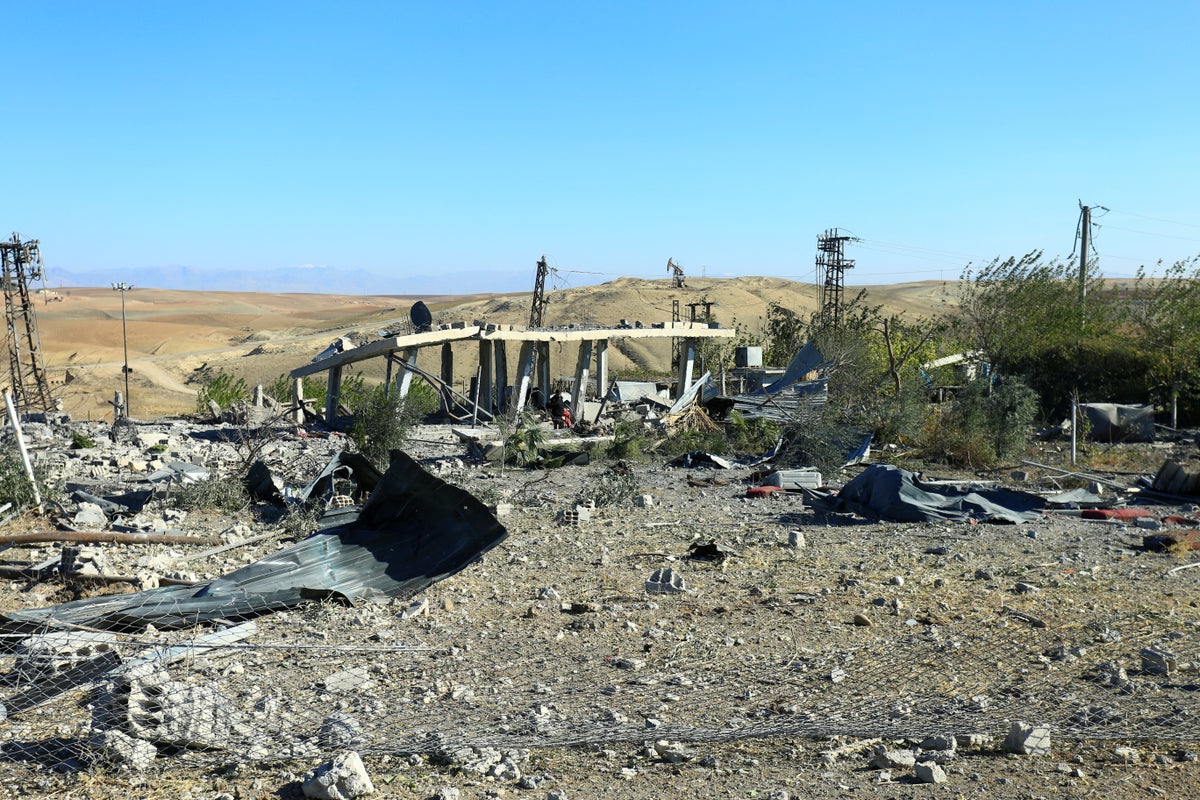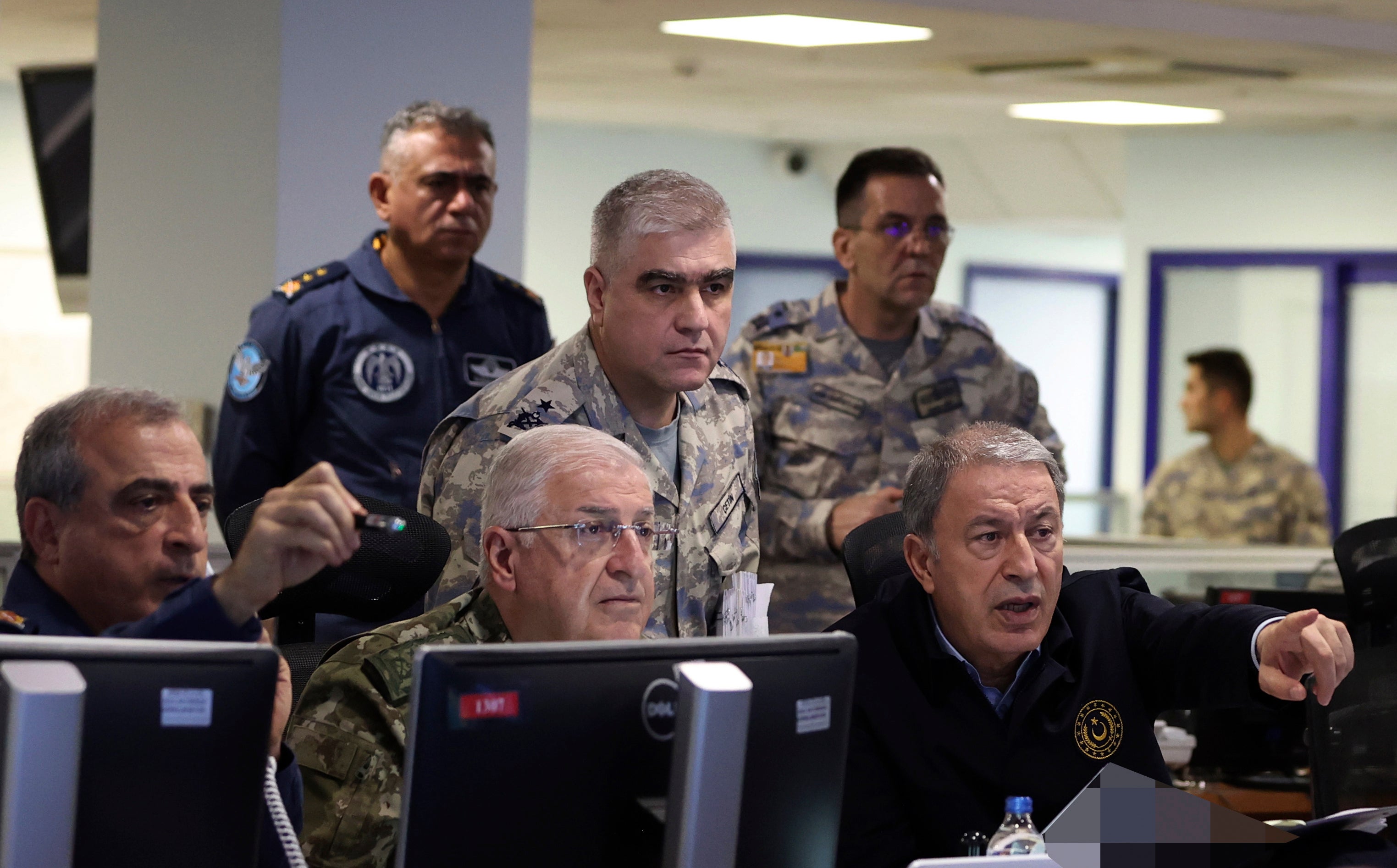
At least 31 people have died after Turkey launched airstrikes on Kurdish armed groups in Syria and Iraq in retaliation for the 13 November bombing of a major pedestrian shopping district in Istanbul.
Turkish F-16 fighter jets and armed drones hammered positions across Kurdish-controlled northern Syria. Among the 31 killed there were regime soldiers, according to the Syrian Observatory for Human Rights, while dozens of others were injured.
Videos posted online showed huge blasts hitting mostly rural areas. Among the Syrian cities and towns targeted were Kobane, a major city that played a crucial role in the war against Isis.
“Terrorists’ shelters, bunkers, caves, tunnels and warehouses were successfully destroyed,” Turkey’s defence minister Hulusi Akar said on Sunday, according to the Anadolu news agency. “The so-called headquarters of the terrorist organisation were also hit and destroyed.”
Turkey dubbed the offensive Operation Claw-Sword. It remained unclear whether a ground offensive would follow the air attacks.
Separately, Iran’s Islamic Revolutionary Guard Corps (IRGC) late on Saturday announced the launch of major operations against Kurdish rebel groups in northern Iraq, as its forces stormed the rebellious Iranian town of Mahabad, killing an undetermined number of people.
“The start of heavy attacks by the Islamic Guard against the terrorists of Iraqi Kurdistan was officially announced,” said a post on an IRGC-affiliated bulletin news Telegram channel. “Minutes ago, the heavy operation of the Iranian IRGC ground forces against the separatist terrorists of Iraq began.”
Turkey has been warning for months that an attack on the positions of the Syrian-based Kurdish armed groups affiliated with the outlawed Kurdistan Workers’ Party (PKK) was imminent. It was restrained by Nato allies as well as Damascus’s patrons in Moscow and Tehran.
Among those reportedly killed in the airstrikes was a journalist for the Hawar news agency, the organisation reported. Mazloum Abdi, a Syrian Kurdish military leader, warned that the Turkish offensive could last a long time.
“We repeat and remind our people that our forces are fully prepared to repel any attack that poses a threat to our people and the territorial integrity of Syria,” he said in a video posted online.
The overnight attacks also killed at least six members of Syria’s government forces, who were apparently stationed at positions alongside the Kurdish armed groups in the provinces of Aleppo and Hasaka.
Syrian Kurds partner with the United States and other allies in combating Isis. But they also collaborate with Syrian regime forces and with Russia, which maintains a presence in the country.
Turkey described Operation Claw-Sword as an act of self-defence targeting only military assets. Ibrahim Kalin, a spokesperson for Turkish president Recep Tayyip Erdogan, said the operation was “in line with international law”.
Mr Erdogan departed for the G20 summit in Indonesia shortly after the 13 November bombing on Istanbul’s busy Istiklal Street. The attack killed six people and injured 81, and shocked Turkey.

Authorities quickly arrested a woman whom they accused of leaving an explosives-filled bag on the busy street after she was trained by the PKK-affiliated Syrian Kurdish group running northeastern Syria. Both the PKK and its affiliates in Syria have strenuously denied responsibility for the attack, which killed Turkish civilians.
Observers expected a response as soon as Mr Erdogan returned from Indonesia. Photographs posted to state media showed the president in the war room late on Saturday, overseeing the offensive.
Security worries tend to rally the Turkish public to the president, who is facing a potentially tough 2023 re-election campaign because of a faltering economy and record inflation.
Ankara last launched a major offensive in northeastern Syria in October 2019, carving out an area that is now under the control of its Syrian allies. It seeks to expand a zone of influence across its border with Syria to which millions of Syrian refugees sheltering in Turkey could return, easing domestic political pressure on the government ahead of the 23 June presidential and parliamentary elections, in which public anxiety over migration will be a major issue.







